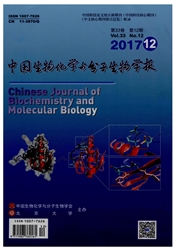

 中文摘要:
中文摘要:
核糖核酸酶抑制因子(ribonuclease inhibitor,RI)是胞浆内的一种酸性蛋白质。已有研究证明,RI与核糖核酸酶A(RNase A)和血管生成素(angiogenin,ANG)结合可抑制其活性。本室前期实验证实,RI可有效抑制某些肿瘤的生长和转移。然而,RI抑制肿瘤的分子机制尚不清楚。本研究探讨RI对小鼠黑色素瘤B16-F10细胞生长和凋亡的影响及其机制。MTT法结合流式细胞术分析结果证明,RI基因稳定转染导致B16-F10黑色素瘤细胞S期阻滞,抑制B16-F10黑色素瘤细胞增殖。Annexin V/PI结合流式细胞术结果显示,RI过表达引起细胞凋亡。与此相一致,蛋白质印迹分析显示,过表达RI引起抗凋亡分子Bcl-2表达下调,而Bax上调,同时伴有Pro-casepase 3激活。C57BL/6小鼠移植成瘤实验显示,与对照相比,转染RI的B16-F10细胞形成的肿瘤重量显著减少,同时伴有肿瘤组织微血管密度降低。提示RI过表达能抑制微血管生成。此外,体内外组织/细胞免疫化学和蛋白质印迹结果揭示,过表达RI可显著抑制整合素连接激酶(integrin-linked kinase,ILK)下游靶分子Akt和GSK-3β的磷酸化,并降低β-联蛋白的表达。研究结果证明,过表达RI可通过抑制ILK/PI3K/AKT信号通路,促进细胞凋亡,引起S期阻滞,并抑制血管生成,从而显著抑制小鼠黑色素瘤B16-F10细胞在体内、外的生长。上述结果提示,RI可能是治疗黑色素瘤的有效分子靶点。
 英文摘要:
英文摘要:
Human ribonuclease inhibitor(RI) is a cytoplasmic protein.RI can interact with ribonuclease A(Rnase A) and angiogenin(ANG),suppressing their activities.We have previously demonstrated that RI may effectively inhibit growth and metastasis in certain tumors.However,the underlying mechanism remains largely unknown.In this study,we investigated in vitro and in vivo effectsof RI on the proliferation and apoptosis of mouse melanoma B16-F10 cells.The combination of MTT and flow cytometry(FCM) showed that stable transfection of the RI gene induced S-phase arrest and inhibited proliferation of mouse melanoma B16-F10 cells.Annexin V/PI staining and FCM revealed that overexpression of RI resulted in apoptotic cell death.Consistently,over-expression of RI down-regulated the anti-apoptotic protein Bcl-2,but up-regulated Bax and activated pro-caspase 3 in Western blotting.Grafting tumor in C57 BL/6 mice showed that compared to the control cells,the growth of tumors coming from grafted RI-transfected B16-F10 cells was retarded,and microvessel density was decreased in tumorbearing C57 BL/6 mice,indicating that RI suppresses angiogenesis of tumor.Furthermore,the cytoimmunochemistry/histoimmunochemistry in vitro and in vivo and Western blotting revealed that overexpression of RI markedly blocked the phosphorylation of Akt and GSK-3β that are ILK downstream signaling targets,and reduced β-catenin expression.Together,to our best acknowledge,this is the first demonstration of that RI may induce cellular apoptosis and S-phase arrest and inhibitory angiogenesis via regulating ILK/PI3 K/AKT signaling pathway,thereby suppresses the growth of mouse melanoma B16-F10 cells in vitro and in vivo.Our data suggest that RI may be a potential target for melanoma therapy.
 同期刊论文项目
同期刊论文项目
 同项目期刊论文
同项目期刊论文
 Small interfering RNA targeting ILK inhibits metastasis in human tongue cancers through repression o
Small interfering RNA targeting ILK inhibits metastasis in human tongue cancers through repression o Down-regulating ribonuclease inhibitor enhances metastasis of bladder cancer cells through regulatin
Down-regulating ribonuclease inhibitor enhances metastasis of bladder cancer cells through regulatin Angiogenin interacts with ribonuclease inhibitor regulating PI3K/AKT/mTOR signaling pathway in bladd
Angiogenin interacts with ribonuclease inhibitor regulating PI3K/AKT/mTOR signaling pathway in bladd Ribonuclease inhibitor up-regulation inhibits the growth and induces apoptosis in murine melanoma ce
Ribonuclease inhibitor up-regulation inhibits the growth and induces apoptosis in murine melanoma ce Small interfering RNA targeting ILK inhibits metastasis in human tongue cancer cells through repress
Small interfering RNA targeting ILK inhibits metastasis in human tongue cancer cells through repress Up-regulating ribonuclease inhibitor inhibited epithelial-to-mesenchymal transition and metastasis i
Up-regulating ribonuclease inhibitor inhibited epithelial-to-mesenchymal transition and metastasis i Downregulation of integrin-linked kinase inhibits epithelial-to-mesenchymal transition and metastasi
Downregulation of integrin-linked kinase inhibits epithelial-to-mesenchymal transition and metastasi A novel role of ribonuclease inhibitor in regulation of epithelial-to-mesenchymal transition and ILK
A novel role of ribonuclease inhibitor in regulation of epithelial-to-mesenchymal transition and ILK 期刊信息
期刊信息
